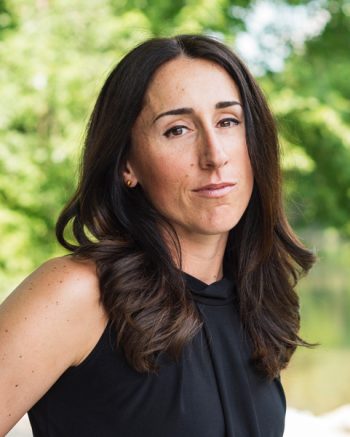
About Tara Stillions Whitehead:
Tara Stillions Whitehead is a writer and filmmaker from Southern California working and teaching in Pennsylvania. Her writing has appeared in several dozen journals and magazines, including Hobart, trampset, Fairy Tale Review, Cream City Review, and The Rupture. Her story, "Seven Bodied I Didn't Leave Behind" was included in Wigleaf's Top 50 in 2021 and her story, "Flashover," was included in Wigleaf's Top 50 in 2022.
Her hybrid chapbook, Blood Histories, was released by South Carolina's Galileo Press/Free State Review, and her debut full-length collection, The Year of the Monster, which has been nominated for the Maya Angelou Book Award, is forthcoming with Unsolicited Press 9.27.22. A second collection of stories titled They More than Burned will be released by ELJ Editions late next year. This story comes from that collection.
What inspires you to write?
I'm inspired to write as exploration. The process of discovery keeps me coming back. Being a filmmaker, professor, and parent provides me with a lot of opportunity to listen. I grew up loud and creative and became quieter and more observant as I got older. I can still get in the way of listening, so I have to make the conscious effort to do that. When I do, I can empathize, and when I empathize, I become receptive to character and story and, most importantly, the message the story and character convey.
What authors do you read when you aren’t writing?
I have a lot of favorite authors: Kurt Vonnegut, Jr., Annie Proulx, Charles Simic, Jamaica Kincaid, James Baldwin, Otessa Moshfegh, Richard Powers, Jericho Brown, Kathy Fish, Larry Fondation, Erin Rodoni, and lots of flash writers–too many to name here.
Tell us about your writing process.
My process has changed a lot since I first started writing to publish. When I was a kid, I would spend hours with a pen in hand or huddled over the electric typewriter my parents got me. I would just generate. I wouldn't edit. Editing didn't come until high school. I shifted to filmmaking and screenwriting then, on through college, which means I was working in the script format. I would say process is different for me when it comes to form, but not much.
After graduate school, after having kids and becoming a full-time professor, I really had to be intentional with my time. I am a 4:00-6:00am writer. I will usually generate in a notebook and transcribe it to computer weeks or months later. I don't create character sketches, but I do look at character need/want/desire and setting. I always have the thematic elements in my mind. This helps drive the "why here? why now? so what? who cares?" questions that a good story should answer.
For Fiction Writers: Do you listen (or talk to) to your characters?
I have full-on conversations with my characters. Many of my notebooks are filled with tag-less dialogue between me and the characters. I will also write in the first-person perspective from certain characters as a means of trying to figure them out.
What advice would you give other writers?
Write what you want to read. It's easy to get swept up in what other people want. I'm not good at living up to other people's expectations if it means sacrificing integrity or intention.
Also, let GOOD editors do their work. I cannot stress enough how working with good or brilliant editors to polish up a book can really make a difference.
How did you decide how to publish your books?
I began publishing short stories in literary magazines in 2009. Once I got a collection together, I looked for presses that published comparable books. I didn't query an agent with my chapbook or two subsequent collections because I recognized certain presses as distributing to those audiences, and I was able to secure contracts with those presses.
Unsolicited Press, which published The Year of the Monster is a wonderful indie press out of Portland. Their books are not only gorgeous, but the editors are great to work with and really love what they do. The press is super organized and has a schedule that they keep to. They do not rush things, and they do not let things slip.
Galileo Press, who published my chapbook, Blood Histories, did a phenomenal job with delivering the "concept album" I'd written. Working with managing editor Barrett Warner was one of the most beautiful experiences for me. He put so much time into the work and into listening to me as we read through the suggested edits. He 100% loves what he does, and the press did a great job of promoting the book and me as an author.
I have just started working with ELJ Editions. All I can say so far is that the EIC and staff there love indie authors and are very supportive and enthusiastic. Enthusiasm is important when it comes to publishing because the process can be long and drawn out. It can be emotional. All of these presses have been enthusiastic cheerleaders for my books. I have been very lucky!
What do you think about the future of book publishing?
There are a lot of "doom and gloom" forecasts about the publishing industry, specifically with the looming monopsony of the larger publishing houses. That said, I think the multimodal platform method of publishing has made books more accessible and allowed for more experimentation, which challenges traditional narratives and publishing in a GOOD WAY.
What genres do you write?: Fiction, Nonfiction, Hybrid, Screenplay
What formats are your books in?: Both eBook and Print
Website(s)
Tara Stillions Whitehead Home Page Link
Your Social Media Links
Goodreads
Twitter
All information in this post is presented “as is” supplied by the author. We don’t edit to allow you the reader to hear the author in their own voice.
